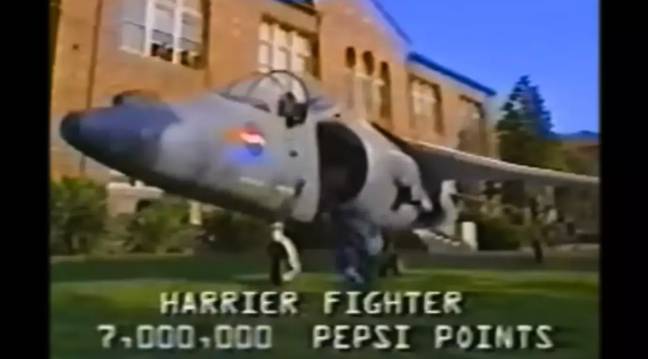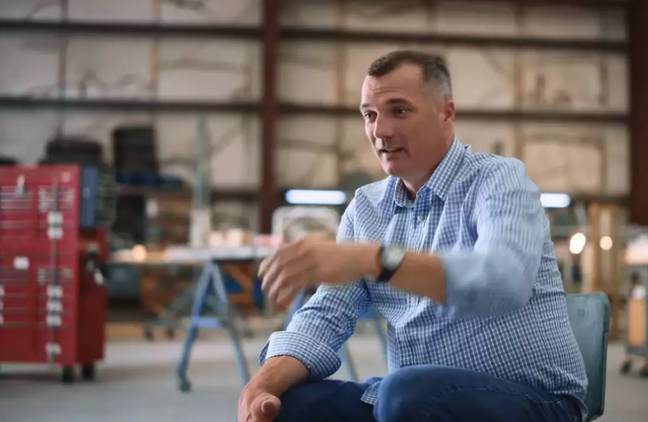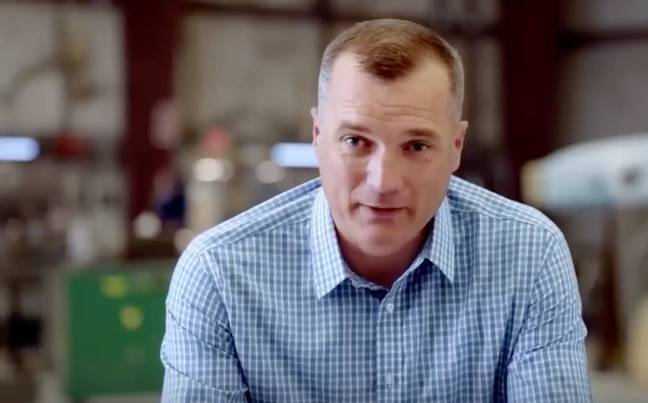In a gripping 2022 Netflix documentary titled “Pepsi, Where’s My Jet?,” an intriguing legal battle from the 1990s resurfaced, shedding light on the transformative influence of advertising and the tenacity of two individuals in pursuit of an improbable dream. Amid the intense cola war between industry giants Coca-Cola and Pepsi during the 1990s, a marketing campaign involving “Pepsi Points” promised extraordinary rewards. This scheme would have far-reaching consequences, culminating in a lawsuit that would challenge the boundaries of advertising ethics and alter industry practices forever.
The Promise of Pepsi Points
In the competitive landscape of the cola industry during the 1990s, Pepsi embarked on an ambitious marketing campaign, introducing the concept of “Pepsi Points.” This innovative strategy allowed consumers to accrue rewards by purchasing Pepsi products. The premise was simple: each purchase would accumulate Pepsi Points, with varying point values based on the product’s size. A fountain drink garnered one point, a two-liter bottle was worth two points, and a 12-pack translated to five points. These points could then be redeemed for an array of Pepsi-branded merchandise, from baseball caps to T-shirts.
However, amongst the array of tantalizing rewards lay a particularly audacious prize—a military-style fighter jet advertised as attainable for a staggering 7,000,000 Pepsi Points. Though it later became evident that this jet was intended as a humorous marketing ploy, no explicit disclaimer in the advertisement clarified its fictitious nature. In 1995, a determined 20-year-old student named John Leonard embarked on an extraordinary mission to obtain the jet by accumulating the requisite number of Pepsi Points.

It turned out that the commercial was purely intended as a joke by Pepsi, but there was no explicit disclaimer in the ad indicating that the jet was not a real prize. In 1995, a determined 20-year-old student named John Leonard set his sights on obtaining the jet by collecting the required number of Pepsi points.
A Plan to Acquire the Jet
Leonard, undeterred by the challenge, pondered, “I started thinking, geez, how could you actually make this work? But I can’t make it happen. And I have had to find a crazy partner in the deal. And luckily, I happen to know somebody that fit the bill.” This partner was none other than Todd Hoffman, a successful businessman who shared Leonard’s audacious vision.

Remarkably, Leonard unearthed a hidden gem in the fine print: Pepsi Points could be purchased for a mere ten cents each. Armed with this revelation, Hoffman wrote a check for the required 7,000,000 points and promptly dispatched them to Pepsi.
Denied by Pepsi
However, Pepsi rebuffed their claim, asserting that the advertisement was purely a jest, offering the duo a mere consolation of free soda coupons. Unwilling to accept this outcome, Hoffman and Leonard chose to escalate their grievance to the legal arena.

The judge ultimately ruled in Pepsi’s favor, stating that no reasonable person would have believed that the jet reward was real. Interestingly, Pepsi had offered Hoffman and Leonard a settlement of $750,000, but they decided to reject it.
The court ultimately ruled in favor of Pepsi, asserting that no reasonable individual would have genuinely believed in the fighter jet’s existence as a prize. Curiously, Pepsi had earlier extended an offer of $750,000 as a settlement, an offer that Hoffman and Leonard boldly declined.
Reflecting on the episode, Leonard admitted that he perhaps should have accepted the settlement. Nevertheless, he still finds amusement in the audacity it took to pursue the case. He wryly remarked, “But I still get a kick out of the fact that I had the chutzpah at that time to actually come to that conclusion. Probably wasn’t the smartest decision I’ve ever made in my life.”
The documentary Pepsi, Where’s My Jet? is available for streaming on Netflix.
The Fallout of the Lawsuit
Though the legal battle against Pepsi ultimately ended in defeat, its ramifications reached far and wide, profoundly impacting the advertising landscape. It underscored the necessity for companies to exercise caution in their promotional practices, ensuring that consumers are not led astray by exaggerated claims. This landmark case precipitated changes in advertising regulations, compelling companies to adopt greater transparency, including explicit disclaimers and heightened restrictions on misleading advertising.
The Lawsuit’s Emphasis on the Influence of Marketing
The lawsuit served as a stark reminder of the immense influence marketing wields and its profound effects on consumers. It vividly illustrated how the allure of a multimillion-dollar fighter jet managed to captivate the imaginations of John Leonard and Todd Hoffman. This case offers a poignant lesson on the critical role of discernment and skepticism when encountering flashy marketing campaigns. While such promotions may be enticing, it becomes imperative to scrutinize the feasibility and authenticity of the claims put forth. This incident underscores the need to assess the substance behind the marketing hype, ensuring that consumers make informed choices instead of succumbing to the allure of marketing tactics.
Legal Challenges Faced by Major Corporations
These prominent companies have all found themselves entangled in a web of legal battles that have garnered significant public attention and scrutiny. Apple, a tech giant, has been no stranger to controversy, grappling with antitrust allegations surrounding its App Store and accusations of deliberately slowing down older iPhone models to encourage users to upgrade.
- Facebook, the social media titan, faced a major crisis when the Cambridge Analytica scandal broke, revealing that user data had been mishandled and exploited. Privacy breaches and concerns about its advertising practices have also led to a series of lawsuits against the company.
- Johnson & Johnson, a multinational pharmaceutical and consumer goods company, has encountered legal challenges linked to the safety of its products. Claims that its talcum powder products could cause cancer and lawsuits concerning opioid painkillers have tarnished the company’s reputation.
- Tesla, led by the charismatic Elon Musk, has been embroiled in various lawsuits, from allegations of securities fraud to product safety issues and disputes with former employees. The electric vehicle manufacturer’s rapid growth has not shielded it from legal woes.
- Walmart, the retail giant, has faced its own set of legal battles, including allegations of gender discrimination, controversies surrounding wage and labor practices, and accusations of selling defective or dangerous products.
- McDonald’s, a global fast-food chain, has found itself in the legal spotlight for issues ranging from workplace safety concerns to disputes over labor practices and persistent health-related debates about its food products.
- Google, the search and advertising behemoth, has faced antitrust lawsuits due to its dominance in online advertising and search. Additionally, privacy concerns stemming from extensive data collection practices have led to legal scrutiny.
- Boeing, a major aerospace company, has confronted a tumultuous period marred by safety issues with its aircraft, particularly the grounding of the 737 MAX following two fatal crashes. These lawsuits and legal challenges have raised questions about the company’s commitment to safety and quality.
It’s worth noting that the legal landscape is ever-evolving, and the outcomes of these lawsuits may have changed since my last update. To obtain the most current information on these cases, consulting recent news sources or legal databases is recommended.
Lessons Learned
Although Leonard and Hoffman did not win their case, their story serves as a cautionary tale looking to capitalize on marketing gimmicks. It underscores the need to carefully assess the credibility of extravagant offers and weigh the potential risks and rewards before embarking on a seemingly impossible quest.
The fascinating story of John Leonard and Todd Hoffman‘s lawsuit against Pepsi for a $23 million fighter jet sheds light on the impact of advertising and the importance of consumer skepticism. While their pursuit may have been unsuccessful, it serves as a reminder to approach enticing promotions with a critical eye. Furthermore, their case prompted changes in advertising regulations, leading to clearer disclaimers and increased transparency in marketing practices.
Sources:
1996 Pepsi man
Unilad
Netflix Documentary

This Site Was Inspired By An Interest in Protecting the Environment:
We had the privilege and joy of learning from Dr. Charlie Stine who instilled a love for the natural world through incredible field trips with the Johns Hopkins Odyssey Certificate program in Environmental Studies. At the time, the program was endorsed by the Maryland Department of Natural Resources. Sadly, after Dr. Stine retired, the program was phased out. We hope that we honor his legacy by shining a bright light on environmental issues and sharing good news about the success of various conservation programs when possible.
